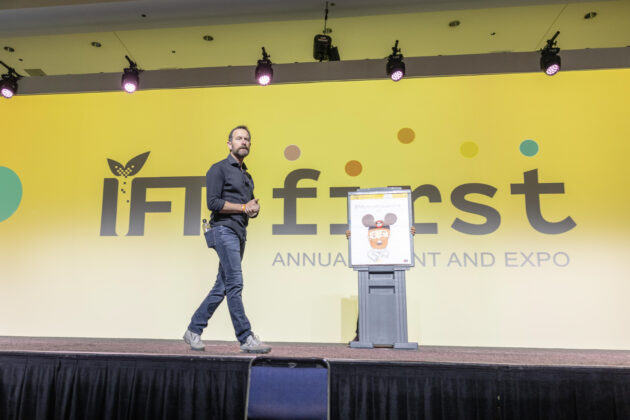
Biotech, plant-based startups earn top recognition at IFT FIRST
By Nithya Caleb
Food Trends IFT FIRST Institute of Food Technologists
The Institute of Food Technologists (IFT) recently held its annual conference and expo, FIRST, in Chicago. Thousands of food industry stakeholders gathered from July 16 to 19 to discuss this year’s theme of “Innovation in a Time of Crisis: Can We Future-Proof the Food System?”
IFT president Chris Downs kicked off the conference with a ceremony celebrating the discoveries and contributions of the science of food community.
“It is you who are working to future-proof the food system,” said Downs. Wherever there is a challenge, you consistently bring science, innovation, and a resolute spirit that carries us forward to ensure people around the world have access to safe, nutritious, and sustainable food.”
Several food professionals and companies were honoured at the conference. The Lifetime Achievement Award in Honor of Nicolas Appert was awarded to Fereidoon Shahidi, PhD, research professor and scholar in the biochemistry department of Memorial University, N.L. Twelve more recipients were honoured with the 2023 IFT Achievement Awards.
Startup pitch competition
A pitch competition for startups was also held at IFT FIRST. Participants from the Startup Pavilion were invited to take part in the multi-stage, rapid-pitch competition. Participants were limited to 90-second pitches in the first round, but in the finale, pitch length was expanded to 2:30. Finalists from each round were decided by a panel of judges spanning academia, venture-capital investment groups, government, incubators, industry leaders, startup coaches and consultants, and product development professionals.
Prizes totaling $15,000 were awarded to the winner and runners up, courtesy of the Seeding The Future Foundation. Helaina, a biotech company working to synthetically produce bioactive proteins, took home the grand prize of $10,000. The startup recently began using precision fermentation to manufacture proteins at scale, starting with Lactoferrin, a protein that supports cognitive health and antimicrobial defense while enhancing nutrient absorption. Lactoferrin, which is traditionally found in breast milk, has the potential to not only improve infant formula, but also enhance functional foods and nutrition at all stages of life.
SnapDNA and unClassic Foods were each awarded $2,500 as the runners-up in the competition. SnapDNA aims to revolutionize the food testing process by reducing the time needed to test for food pathogens, spoilage agents, and allergens. Through its onsite analysis technology, SnapDNA can reduce the traditional pathogen test timeline of three to seven days to less than one hour, reducing storage costs for food companies and ensuring food safety for consumers. The second runner-up, unClassic Foods, uses oyster mushrooms to create a plant-based meat substitute.
“The Pitch and Startup Pavilion exemplifies food innovation and the spirit of entrepreneurship in every sense. With the support of the Seeding the Future Foundation and its founder, Bernhard van Lengerich, we were able to add new, exciting layers to this increasingly popular event at IFT FIRST and we look forward to seeing what our 2024 global startup participants have in store for next year,” said IFT CEO Christie Tarantino-Dean.
This year’s IFT FIRST Startup Pavilion featured more than 85 food or foodtech startups, nearly doubling in size from last year. Fifty-four of those startups competed in the pitch with 14 countries being represented.
Keynote presentation on innovation

Duncan Wardle, former head of innovation and creativity at Disney offered a keynote presentation on “Embedding Innovation into Everyone’s DNA.”
Wardle was funny, and from the start, inspired the audience with his playful, idiosyncratic role plays and situations to think ingeniously. He encouraged businesses to nurture the playful, creative sides of employees, which is crucial for innovation. He also said it’s crucial to bring in new experts or people with different skills sets to foster innovation. Wardle also addressed the elephant in the room: Artificial intelligence (AI). He said creativity, intuition, curiosity, imagination will be the most employable skills in the next century, as they can’t be programmed into AI-empowered bots/robots.
Educational track
IFT had also organized several educational sessions on food science, research, and business. Sustainability, food waste, upcycling, new processing technologies, supply chain issues were addressed.
One of the panel discussions was on “Reimagining Food Waste to Put the ‘P’ in Profit & Loss.” Agricultural and food processing by-products such as fruit and vegetable skins, pulp, and spent grains are usually disposed of. However, these by-products have other potential uses. Panelists explained how the so-called agri-food waste are just ‘resources in the wrong place.’ It is possible for food companies for create a new, profitable revenue stream with these materials.
Hosahalli Ramaswamy, PhD, professor at McGill University, spotlighted acidified thermal processing as a novel technology that can lead to cost savings when manufacturing canned products. Thermal processing of low acid foods (pH > 4.6) requires high temperatures (110-121 C) for long periods to ensure canned products are safe for consumption. However, the high temperatures cause high-level nutrient and quality degradation in canned foods. Professor Ramaswamy’s presentation highlighted studies that found products, which are consumed with added acid during food preparations, can benefit from adding the same acid prior to processing to decrease their pH to <4.6 and process them as foods belonging to the acid category.
“Expect the Unexpected: Failure to Anticipate Threats is a Critical Food Safety Risk” panel discussion stressed the importance of detailed risk mitigation strategies at food companies. In recent times, meat packing plants were closed due to cyberattacks; fake organic grains due to fraud were found; and systemic network outages because of maintenance failures affected food business. The panelists discussed the steps organizations need to take and strategies to implement in order to safeguard the business from unimaginable food safety issues.
Expo floor
Over 800 food companies showcased their products at IFT FIRST. Several Canadian companies were there too, such as FlavorCan, Bartek Ingredients, Blendtek Ingredients, Prairie Fava, HPS Food and Ingredients, Chinova Bioworks, etc.
Save the date
Next year, IFT FIRST will be held from July 14 to 17 at McCormick Convention Center, Chicago.
Print this page